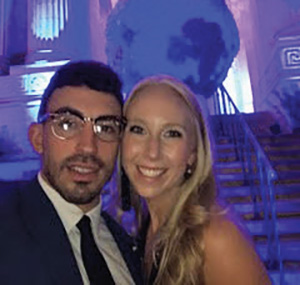
The OU has certified-as-kosher formula production facilities in Mexico and Singapore, with plans to expand to the U.K. and Spain.
In February, a baby formula production facility in Sturgis, Michigan, run by Abbott Laboratories, was shut down over reports of bacterial contamination. Combined with record inflation and supply chain issues, by May roughly 40% of baby formula products were out of stock across the U.S.
Among the Americans hit hardest by the formula shortage are members of the Orthodox Jewish community, which has more than double the average U.S. birth rate and only uses kosher-certified formulas—meaning, more mouths to feed with fewer choices of formula.
“We have large families … and therefore, the issue was much more acute,” Rabbi Moshe Elefant, the chief operating officer of the Orthodox Union’s kosher certification program, told eJewishPhilanthropy. In particular, “when you have children that have specific [health problems], then they have to have that specific formula that addresses their health issue. And if that formula is not available, it becomes a very, very serious issue.”
But soon came a way for the OU to ease the pressure on Orthodox Jewish families: The U.S. Food and Drug Administration (FDA), which traditionally blocks most baby formula imports, relaxed its rules to allow companies to bring in formulas from overseas to address the shortage.
“As soon as these companies got the FDA calls, they called us,” Elefant said. Abbott and Mead Johnson Nutrition, two of the largest manufacturers of baby formula in the world, wanted to make sure the formula they were importing was kosher. So the OU sent out an emergency team of rabbis to quickly certify overseas plants, clearing factories in Singapore and Mexico, with plants in Spain and the United Kingdom soon to be certified as well. The OU is also reaching out to companies with whom they have no preexisting relationships to certify as many plants as possible.
“This is really to the credit of these companies,” Elefant said. “They are strongly working on getting product into the country, but they’re very much sensitive to the kosher community to make sure that the product is kosher certified, recognizing the needs of our community.”
Kosher certification takes about two to three weeks, with rabbis checking both the ingredients of the formula, and what other ingredients are handled by factory equipment to avoid contamination with non-kosher material. Elefant likens the attention to detail to cooking a kosher chicken.
“You could go to the store and buy a kosher chicken, and the kosher chicken is perfectly kosher,” he said. “But if you take it to a home that’s not kosher, and that chicken is cooked in a non-kosher pot, you can’t eat that chicken, because it now became non-kosher. Same thing goes for [baby formula production equipment].”
After the ingredient check, rabbis do a physical inspection of the production facility to make sure their information is accurate, and to check any other issues that may come up. Once the OU’s requirements are met, the plant receives the certification. Companies pay a fee for the certification, which Elefant did not share, but he says the cost is “insignificant” given the overall revenue of these companies.
For all the effort going into certifying overseas baby formula plants, it isn’t clear how long that certification will be relevant to the U.S. market. The FDA may restrict imports of baby formula once it feels the shortage is over.
“What will happen when the domestic production gets back up to snuff, and they’re able to produce enough?” Elefant said. “Will [companies] still be anxious to bring their product in? I don’t know. I really can’t answer.”
The OU will likely find out soon, as Abbott’s Sturgis factory is restarting operations to produce baby formula, though it will take another six weeks for the product to hit shelves. “If that facility opens up, and that facility is an OU certified facility … that will alleviate the shortage, I would say, very quickly,” Elefant said.
By Lev Gringauz/ www.ejewishphilanthropy.com









